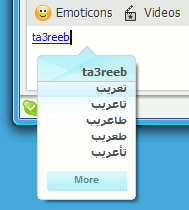 Yamli has officially released its free API that allows the easy integration of its award-winning Arabic transliteration technology into any website. Yamli’s Smart Arabic Keyboard allows users to type Arabic using Latin characters by converting their words in real time into Arabic text. Third-party websites using the API can reach a larger group of Arabic speaking visitors who would otherwise find typing Arabic difficult.
Yamli has officially released its free API that allows the easy integration of its award-winning Arabic transliteration technology into any website. Yamli’s Smart Arabic Keyboard allows users to type Arabic using Latin characters by converting their words in real time into Arabic text. Third-party websites using the API can reach a larger group of Arabic speaking visitors who would otherwise find typing Arabic difficult.
According to co-founder Habib Haddad, “We are very excited about making this technology available to any website for free. We hope it will encourage every user to be more engaged with the Arabic language not only on Yamli.com but on all Arabic sites and blogs. Our approach makes a significant contribution to the Arabic web by actually reducing the proliferation of transliterated Arabic words and converting them into real Arabic words,” concluded Haddad.
Various studies show that a large portion of Arabic internet users shy away from typing Arabic, choosing instead to write Arabic phonetically using Latin characters in an ad-hoc and informal fashion. The transliteration of Arabic words and the limited availability of Arabic keyboards have stymied the use of Arabic on the web. By making it easy for everyone to type in Arabic, Yamli.com is making the Arabic language more accessible for every day users, and helping to promote Arabic content on the web.
According to George Akra, Co-founder of Ikbis, the popular photo and video sharing service, “I think Yamli is one of the most innovative and useful services in the region, plugging the API to our site was easy and lead to the increase of Arabic comments on Ikbis.com. The simplicity and accuracy of the service is just remarkable,” concluded Akra.
The technology allows users to fully engage with Arabic content on blogs, e-commerce, social networking, education, government, video and music websites. The API, which has been undergoing testing since March with selected partners, such as Maktoob, Annahar, Moheet, ART TV, 3alarasi, and Babnet, has already been used by hundreds of thousands of users already.
According to Sami Tueni, the General Manager of Naharnet, a leading Lebanese news and services portal, “Yamli is the best contribution to the Arab web. So easy to implement, it was the long awaited tool to help the Arabic language flourish online,” concluded Tueni.
You can get more info about the API at www.yamli.com/api
The Arabic version of StartUpArabia has been using the Yamli API for quite some time now, integrating the very useful Arabic transliteration functionalities in the user comments area. It was really easy to setup and integrate, and only took a couple of minutes time.
But to make things even easier and straight-forward for website developers to integrate the Yamli functionalities into their websites, a new easy setup page has been added that enables developers to configure the Yamli API and generate the bit of code needed to integrate it exactly the way they need it.
On another note, in a recent conversation with Yamli co-founder Habib Haddad, he shared the info that Yamli is working on an exciting big new project that aims to take Arabic search to a whole new level, making it much more relevant for Arab search users. More details will follow about this project as they become available.
 Yamli, the startup that specializes in smart transliteration technologies for the Arabic Web, just unveiled its new official iOS application for the iPhone and the iPad, bringing their technology to their users while on the move on their mobile phones and tablets.
Yamli, the startup that specializes in smart transliteration technologies for the Arabic Web, just unveiled its new official iOS application for the iPhone and the iPad, bringing their technology to their users while on the move on their mobile phones and tablets.





